|
Itchy scalp is likely to bring social embarrassment. It can be associated with or without a local problem; common causes include dry scalp, dandruff, allergies, dermatitis, parasites, fungal or bacterial infection. When there are obvious changes on the scalp such as heavy scaling, discharges, painful spots, redness, thickening patches, hair loss or other areas of the body are also affected, you should seek a skin specialist for professional treatment.
If you don't think the itchy scalp is duo to any skin problem or disease, then you should pay attention to your daily habits. Generally, thick hair and dry scalp don't need to wash every day, because a layer of natural oil can provide moisture and protection for the skin and hair. Winter and autumn are more often to experience itchy scalp, it is acceptable to wash less frequently. Only those with very fine hair, oily scalp, a lot of sweat or who live in very humid place have to wash daily. On the other hand, when the hair is not cleaned enough, a buildup of oil and dead cells can cause the scalp flaking and itching easily. In some cases, itchy scalp may be resulted from using hair products, check carefully to see what product has induced the irritation. Things like a healthy diet that rich in vitamin B and zinc, and stress management are also important for healthy scalp and hair.
Itchy scalp can often be relieved with appropriate OTC products along with some daily habit changes. However, when it becomes very disturbing, and no cause is found, traditional Chinese medicine (TCM) is an option for relief.
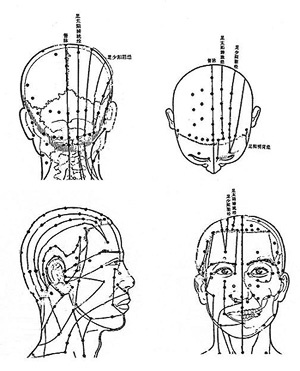
The acupoints and meridians of the head
|
Chinese herbal remedies to stop itchy scalp
From a TCM holistic view, the head is closely connected with other parts of the body, and all the organs are responsible for nourishing it. When the meridian system is free flowing and supplies sufficient blood and qi to the head, normal activities of the head can be ensured. However, when the meridian system is disrupted by internal or external factors that result in impeded flow of blood and qi in the head region, itchy scalp will then develop. TCM claims that itchy scalp may appear in following ways:
 Damp-heat accumulated in the scalp; Damp-heat accumulated in the scalp;
 Blood deficiency and over-functioning liver that lead to inadequate nourishment of the scalp. Blood deficiency and over-functioning liver that lead to inadequate nourishment of the scalp.
Physicians will soothe the irritated scalp according to the condition of scalp and accompanied body symptoms and signs.
Blood deficiency with excess wind and dryness
The itchy scalp looks dry and flaky, and may appear scratching and bleeding marks on it. Individuals are mainly elderly, and may accompany with dizziness, insomnia, forgetfulness, pale complexion, and hard stools. The tongue is pale, and the pulse is taut and slow or taut and thready. The symptoms are usually aggravated in winter and spring seasons. The remedy should aim to enrich blood, lubricate dryness, disperse wind and stop itching.
Sample of prescription: modified Angelica Root Drink plus sour jujube seed and polygala root.
Wind and dampness mixing with heat
The itchy scalp has scratching and bleeding marks, looks slightly red and swelling, and may appear eczema changes or thickening. Individuals are mainly young or middle-aged adults, and the skin condition tends to be aggravated in summer and autumn seasons. The tongue is red and covered with white greasy or thin yellowish greasy coating, and the pulse is taut and rolling. The remedy should aim to disperse wind, drain away dampness, clear heat and stop itching.
Sample of prescription: modified Wind Dispersing Powder plus amur corktree bark, and peony root bark.
After the routine treatment, physicians may suggest the patients to take the Gentiana Macrophylla Root Pill or other proprietary Chinese medicines for a period of time, so as to consolidate the therapeutic results.
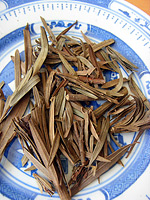 |
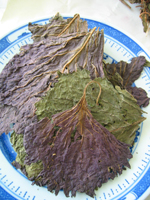 |
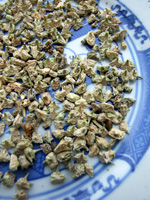 |
| Oriental arborvitae leafy-twig |
Perilla leaf |
Caltrop fruit |
External herbal remedies for itchy scalp
External remedies play an important role for the treatment of itchy skin. The remedies can work directly on the scalp to eliminate the irritating pathogens, improve blood circulation, control dandruff, stop itchiness, and ensure the scalp to resume in a balance and healthy condition. For those with a mild itchy scalp, external remedies alone is well enough for relief. For stubborn and intractable itchy scalp, oral remedies usually work together with external remedies, which not only relieve the itchy symptom, but also promote the overall recovery. The followings are the external anti-itch remedies for itchy scalp:
 |
Chrysanthemum, mulberry root-bark, aconite root, Jehol ligustium rhizome, pine leaf, vitex fruit, yerbadetajo herb, holy basil and mulberry mistletoes, for 100g each. Process into a coarse mixture, and store in a container. Each time, take 150g of the mixture and decoct to make 1500ml of herbal solution for washing the scalp and hair. This is suitable for dry and itchy scalp with or without dandruff. |
 |
Oriental arborvitae leafy-twig (50g), perilla leaf (50g), caltrop fruit (100g). Process into a coarse mixture, and put in a cotton bag, cook with 1500ml of water for 30 minutes, then filter the solution in another container, and let it cool down. Dip a towel in the solution, cover on the head and massage for a while. Do this in the morning and night. This helps clear heat, lubricate skin, and stop itching, which are suitable for dry itchy scalp. |
 |
Fresh mulberry leaf (250g, juiced) is a folk method to arrest common dandruff. Mix the juice with 1500ml of water, put into the refrigerator to cool for a while, dip in a towel and cover on the head and massage for a while. Do this in the morning and night for three to five days. |
 |
Sopora root, wild chrysanthemum and dictamnus root bark, for 30g each. Decoct a solution and use it for washing hair and scalp, twice daily. This helps eliminate wind, clear heat, detoxify and stop itching, which are suitable for oily and itchy scalp. |
 |
Vitex fruit (60g), ledebouriella root (90g), mulberry mistletoes (90g), gentiana macrophylla root (30g), hemp seed (30g), Dahurian angelica root (120g). Process into a coarse mixture, and store in a container. Each time, take 140g of the mixture and decoct to make 1500ml of herbal solution for washing the scalp and hair. This is suitable for oily scalp with or without dandruff. |
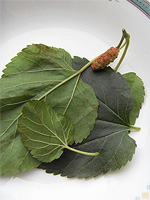
Fresh mulberry leaf
|
Healthy tips for itchy scalp
When individuals are undergoing the anti-itch treatment, they should still avoid the triggering and aggravating factors in everyday life, so as to ensure a complete relief. Some beneficial measures for protecting the scalp are below:
 |
Avoid scratching or using objects to stimulate the scalp |
 |
Get a little sun to temper the irritated scalp |
 |
Keep a balance between work and rest, and have adequate sleep |
 |
Minimize stress, and exercise regularly |
 |
Use mild and anti-itch shampoo |
 |
Reduce using hair styling products |
 |
Keep a plain and easily digested diet, avoid smoking, alcohol, greasy and spicy food, as they promote the secretions of the skin and further irritate the scalp. On the other hand, food like wax ground, hawthorn fruit, coix seed, Chinese radish, black sesame and soy bean are beneficial. |
 |
A healthy juice for itchy scalp: fresh celery (100g), one tomato, pear (150g); squeeze out the juice of the ingredients, add in several drops of lemon juicy and stir evenly, drink daily. |
 |
A healthy tea for itchy and oily scalp: wolfberry, chrysanthemum, hawthorn fruit and lotus leaf, prepare in equal amount; process into a coarse mixture, and store in a container. Take 20g of the mixture to make a tea and drink warm every day. |

Fresh fruit juices are beneficial to itchy scalp.
|
|